Shows
 Sapphire FM On DemandNEW - Wavelength Music Documentary: Bits & Pieces of England, Pt 2Peter Sellers; Soldiers; WW1 & WW2; Dr Johnson's Dictionary; Hancock's Half Hour; ArtIntroduction (01.13) Steeleye Span/The Hard Times Of Old England (06.17) Peter Sellers & Irene Handl/The Critics (12.38) Mike Batt/Portishead Radio (16.18) Pink Floyd/Introduction from When The Tigers Broke Free (film soundtrack version, The Wall) (16.42) Edward Woodward/The Soldiers Of The Queen (film soundtrack version, Breaker Morant) (18.22) Crowning of Elizabeth 1 (film soundtrack, Shakespeare In Love) (19.00) Elizabeth 1 at Tilbury, August 9, 1588 (film soundtrack Fire Over England, 1937, Dame Flora Robson) (19.29) George Formby/Bless 'Em All (20.23) Bertrand Russell/On Pacifism & The Great War (with Ralph Vaughan Williams' The Lark Ascending, LSO, c...2025-04-1259 min
Sapphire FM On DemandNEW - Wavelength Music Documentary: Bits & Pieces of England, Pt 2Peter Sellers; Soldiers; WW1 & WW2; Dr Johnson's Dictionary; Hancock's Half Hour; ArtIntroduction (01.13) Steeleye Span/The Hard Times Of Old England (06.17) Peter Sellers & Irene Handl/The Critics (12.38) Mike Batt/Portishead Radio (16.18) Pink Floyd/Introduction from When The Tigers Broke Free (film soundtrack version, The Wall) (16.42) Edward Woodward/The Soldiers Of The Queen (film soundtrack version, Breaker Morant) (18.22) Crowning of Elizabeth 1 (film soundtrack, Shakespeare In Love) (19.00) Elizabeth 1 at Tilbury, August 9, 1588 (film soundtrack Fire Over England, 1937, Dame Flora Robson) (19.29) George Formby/Bless 'Em All (20.23) Bertrand Russell/On Pacifism & The Great War (with Ralph Vaughan Williams' The Lark Ascending, LSO, c...2025-04-1259 min In Our TimeCatherine of AragonMelvyn Bragg and guests discuss Catherine of Aragon (1485-1536), the youngest child of the newly dominant Spanish rulers Ferdinand and Isabella. When she was 3, her parents contracted her to marry Arthur, Prince of Wales, the heir to the Tudor king Henry VII in order to strengthen Spain's alliances, since Henry's kingdom was a longstanding trade partner and an enemy of Spain's greatest enemy, France. For the next decade Catherine had the best humanist education available, preparing her for her expected life as queen and drawing inspiration from her warrior mother. She arrived in London to be married when she...2025-03-1352 min
In Our TimeCatherine of AragonMelvyn Bragg and guests discuss Catherine of Aragon (1485-1536), the youngest child of the newly dominant Spanish rulers Ferdinand and Isabella. When she was 3, her parents contracted her to marry Arthur, Prince of Wales, the heir to the Tudor king Henry VII in order to strengthen Spain's alliances, since Henry's kingdom was a longstanding trade partner and an enemy of Spain's greatest enemy, France. For the next decade Catherine had the best humanist education available, preparing her for her expected life as queen and drawing inspiration from her warrior mother. She arrived in London to be married when she...2025-03-1352 min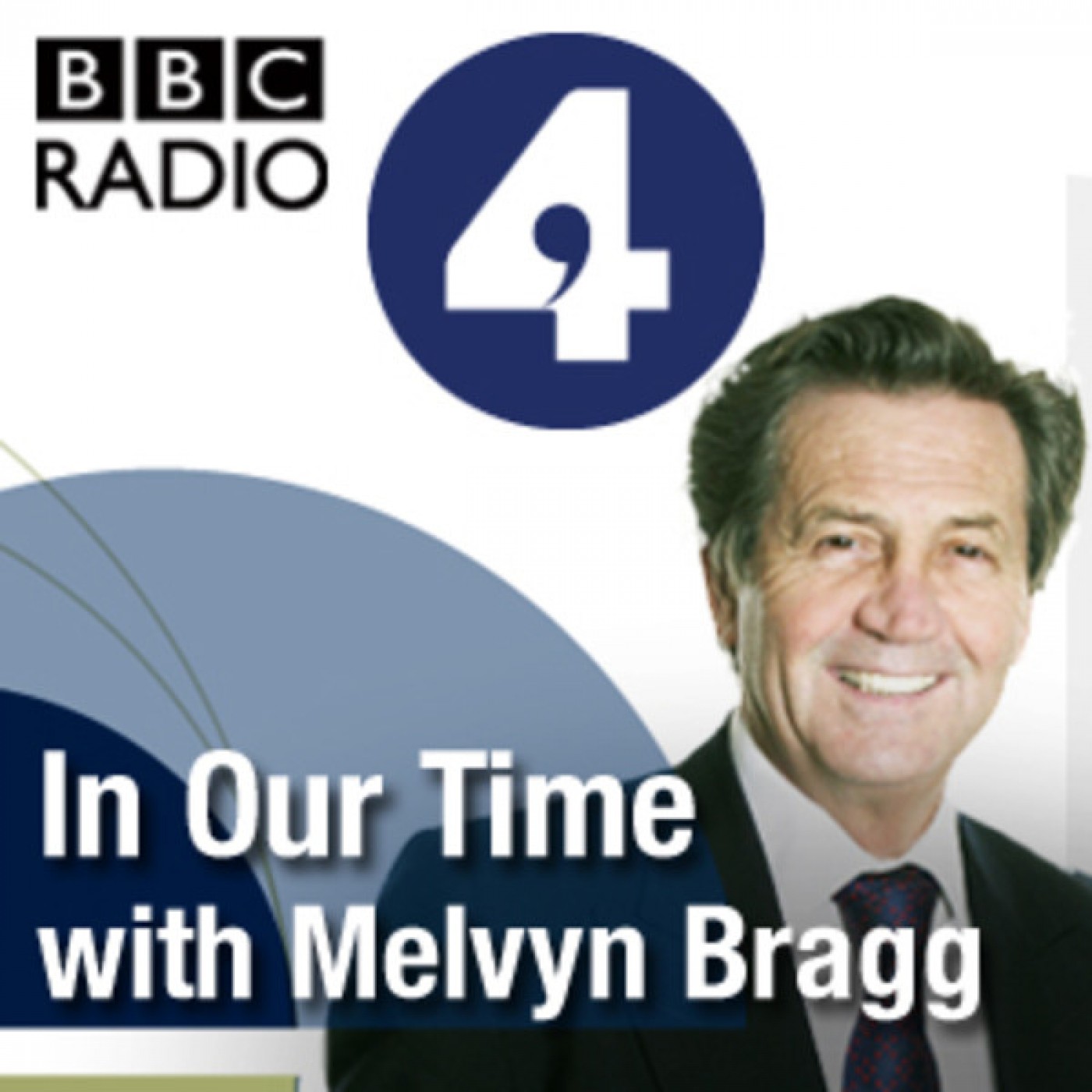 In Our Time With Melvyn BraggCatherine of AragonMelvyn Bragg and guests discuss Catherine of Aragon (1485-1536), the youngest child of the newly dominant Spanish rulers Ferdinand and Isabella. When she was 3, her parents contracted her to marry Arthur, Prince of Wales, the heir to the Tudor king Henry VII in order to strengthen Spain's alliances, since Henry's kingdom was a longstanding trade partner and an enemy of Spain's greatest enemy, France. For the next decade Catherine had the best humanist education available, preparing her for her expected life as queen and drawing inspiration from her warrior mother. She arrived in London to be married when she was 15...2025-03-1354 min
In Our Time With Melvyn BraggCatherine of AragonMelvyn Bragg and guests discuss Catherine of Aragon (1485-1536), the youngest child of the newly dominant Spanish rulers Ferdinand and Isabella. When she was 3, her parents contracted her to marry Arthur, Prince of Wales, the heir to the Tudor king Henry VII in order to strengthen Spain's alliances, since Henry's kingdom was a longstanding trade partner and an enemy of Spain's greatest enemy, France. For the next decade Catherine had the best humanist education available, preparing her for her expected life as queen and drawing inspiration from her warrior mother. She arrived in London to be married when she was 15...2025-03-1354 min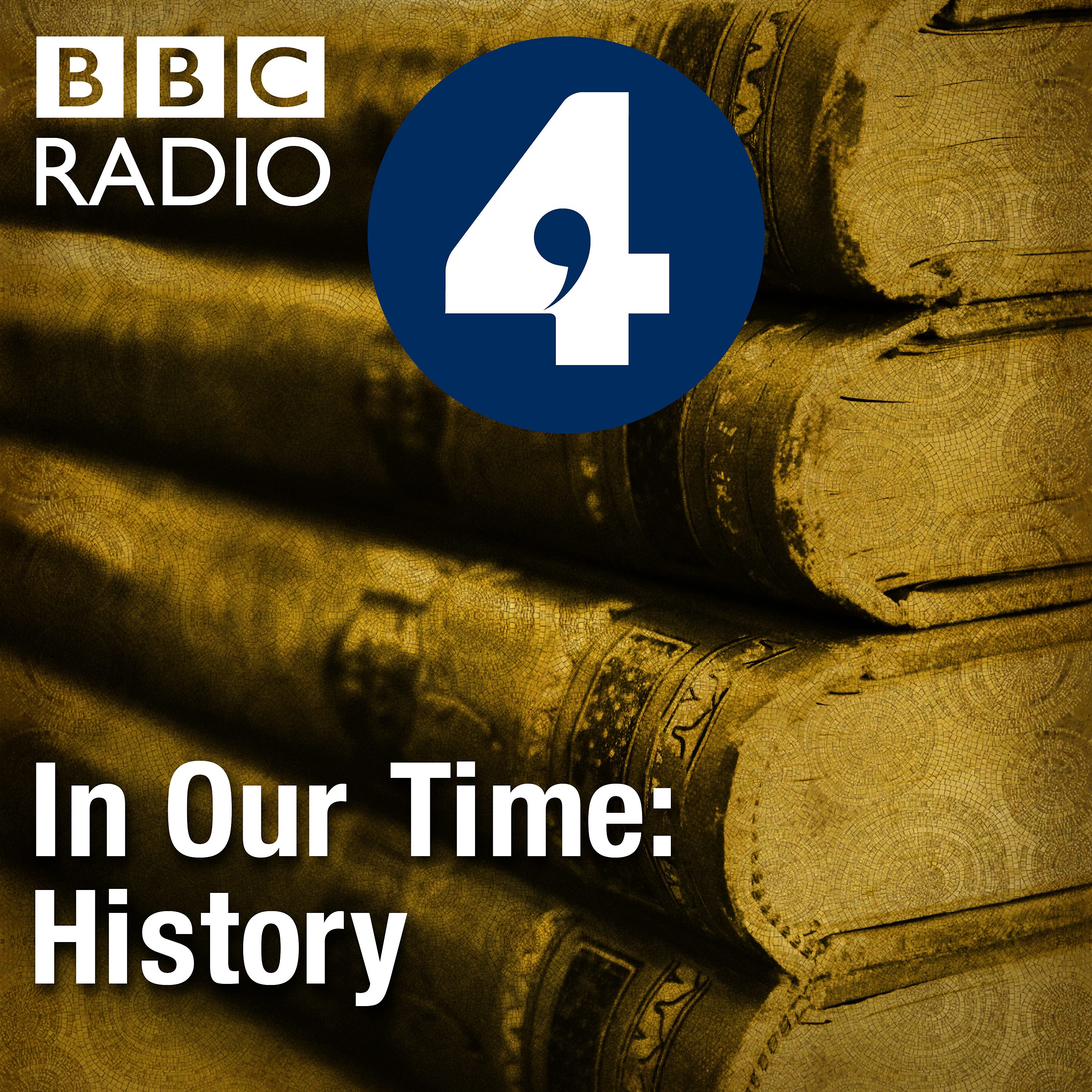 In Our Time: HistoryCatherine of AragonMelvyn Bragg and guests discuss Catherine of Aragon (1485-1536), the youngest child of the newly dominant Spanish rulers Ferdinand and Isabella. When she was 3, her parents contracted her to marry Arthur, Prince of Wales, the heir to the Tudor king Henry VII in order to strengthen Spain's alliances, since Henry's kingdom was a longstanding trade partner and an enemy of Spain's greatest enemy, France. For the next decade Catherine had the best humanist education available, preparing her for her expected life as queen and drawing inspiration from her warrior mother. She arrived in London to be married when she...2025-03-1352 min
In Our Time: HistoryCatherine of AragonMelvyn Bragg and guests discuss Catherine of Aragon (1485-1536), the youngest child of the newly dominant Spanish rulers Ferdinand and Isabella. When she was 3, her parents contracted her to marry Arthur, Prince of Wales, the heir to the Tudor king Henry VII in order to strengthen Spain's alliances, since Henry's kingdom was a longstanding trade partner and an enemy of Spain's greatest enemy, France. For the next decade Catherine had the best humanist education available, preparing her for her expected life as queen and drawing inspiration from her warrior mother. She arrived in London to be married when she...2025-03-1352 min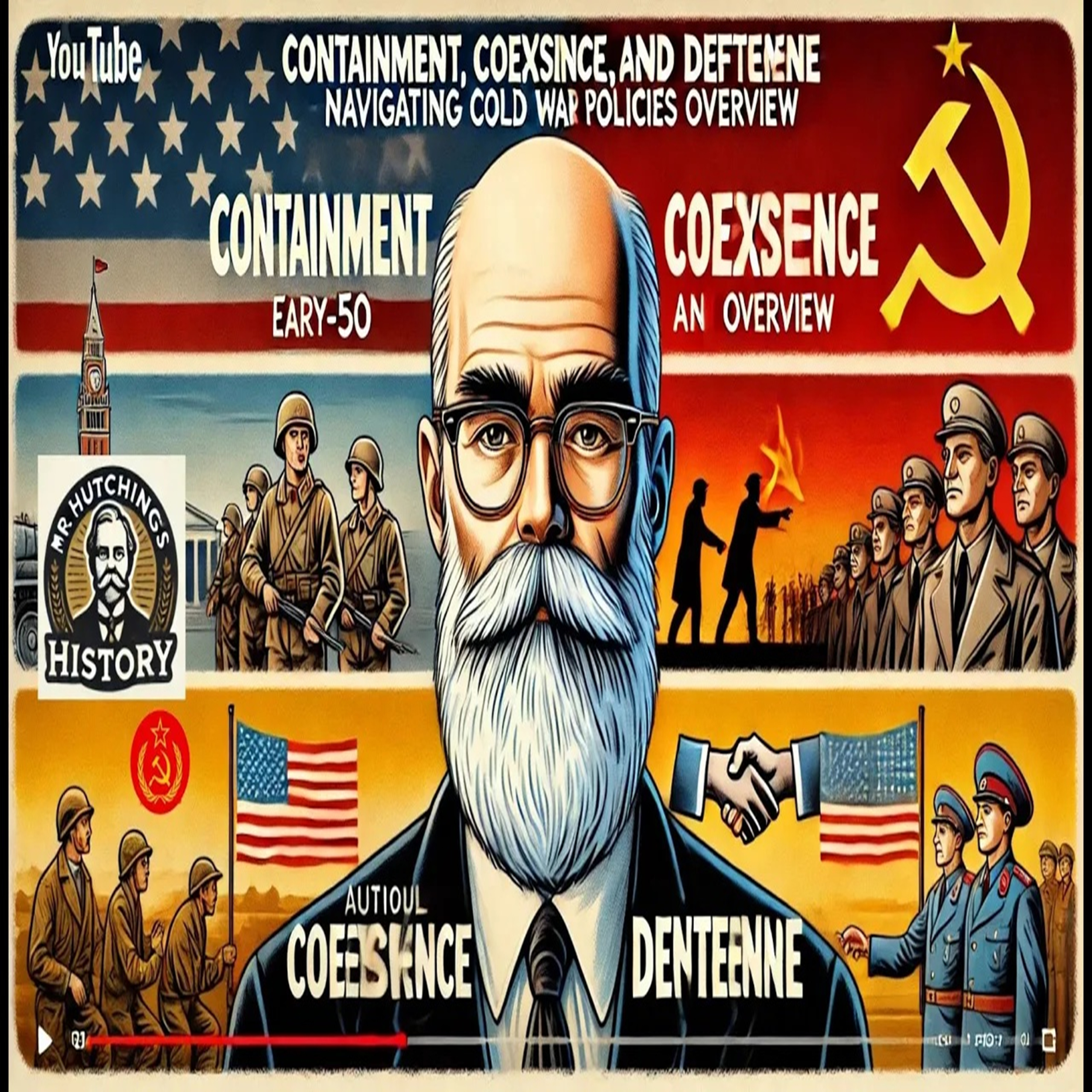 Mr. Hutchings HistoryContainment, Coexistence, and Détente – Navigating Cold War Policies: An OverviewWelcome to Mr. Hutchings History! In this episode, we delve into the key Cold War policies, exploring the US strategy of containment, the concept of peaceful coexistence, the nuclear arms race, and the emergence of détente. We'll examine how these policies shaped superpower relations from 1945 to the 1970s, discussing the successes and limitations of US efforts to combat Soviet influence, especially in Europe and Asia. We also explore China’s shifting relations with both the US and USSR and how détente marked a temporary easing of Cold War tensions.Key Topics:The US policy of c...2024-11-2112 min
Mr. Hutchings HistoryContainment, Coexistence, and Détente – Navigating Cold War Policies: An OverviewWelcome to Mr. Hutchings History! In this episode, we delve into the key Cold War policies, exploring the US strategy of containment, the concept of peaceful coexistence, the nuclear arms race, and the emergence of détente. We'll examine how these policies shaped superpower relations from 1945 to the 1970s, discussing the successes and limitations of US efforts to combat Soviet influence, especially in Europe and Asia. We also explore China’s shifting relations with both the US and USSR and how détente marked a temporary easing of Cold War tensions.Key Topics:The US policy of c...2024-11-2112 min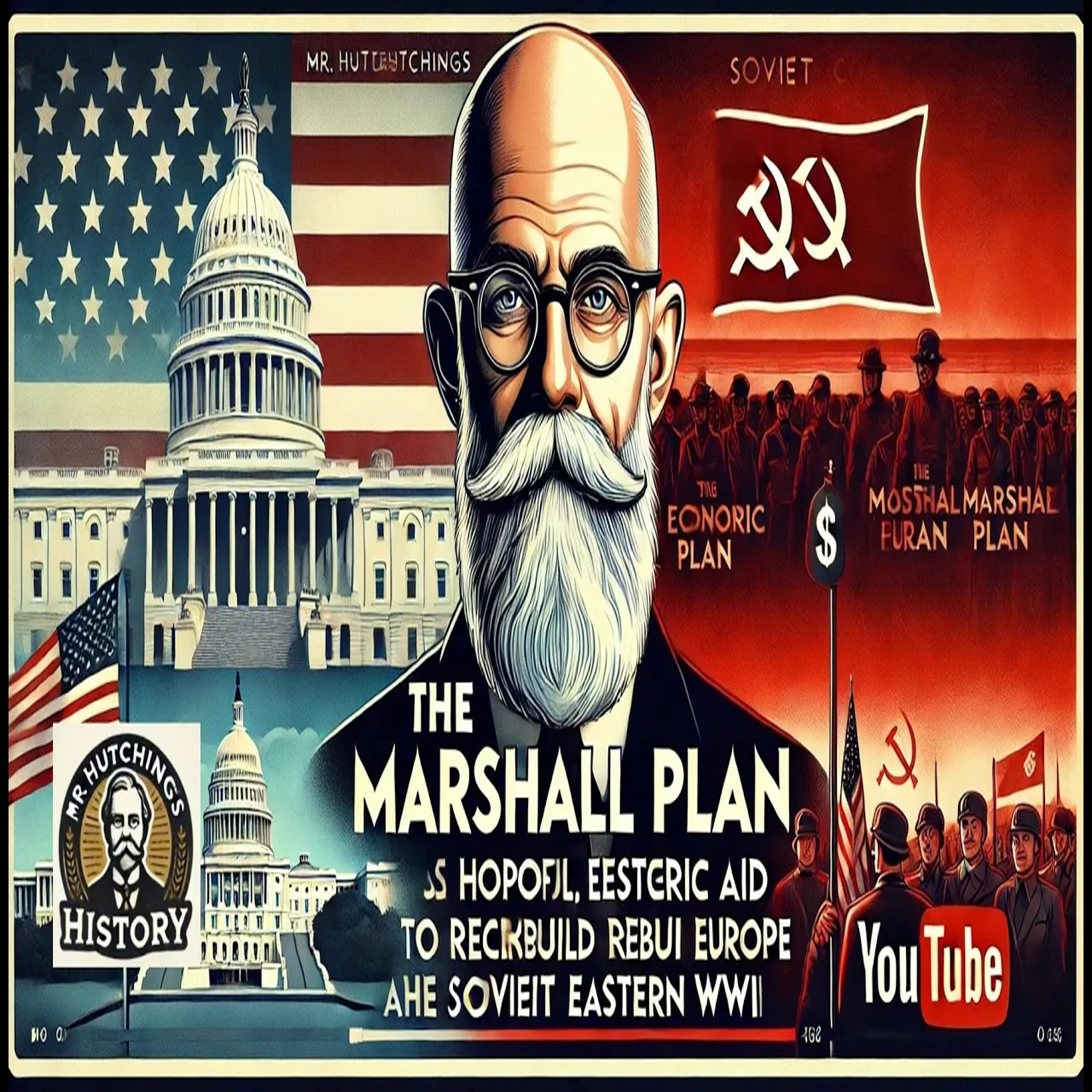 Mr. Hutchings HistoryThe Marshall Plan – Dividing Europe Economically, Politically, and MilitarilyWelcome back to Mr. Hutchings History! In this episode, we examine the Marshall Plan and its pivotal role in the post-WWII division of Europe. Announced in 1947, the Marshall Plan aimed to rebuild war-torn Western Europe, but its effects were far-reaching—shaping political, economic, and military divides. We explore how US economic aid helped create a capitalist bloc in Western Europe while driving a wedge between East and West. We also discuss the historical interpretations of the plan’s impact, from Orthodox to Revisionist perspectives.Key Insights:Economic and political consequences of US aid to Western EuropeThe crea...2024-11-2117 min
Mr. Hutchings HistoryThe Marshall Plan – Dividing Europe Economically, Politically, and MilitarilyWelcome back to Mr. Hutchings History! In this episode, we examine the Marshall Plan and its pivotal role in the post-WWII division of Europe. Announced in 1947, the Marshall Plan aimed to rebuild war-torn Western Europe, but its effects were far-reaching—shaping political, economic, and military divides. We explore how US economic aid helped create a capitalist bloc in Western Europe while driving a wedge between East and West. We also discuss the historical interpretations of the plan’s impact, from Orthodox to Revisionist perspectives.Key Insights:Economic and political consequences of US aid to Western EuropeThe crea...2024-11-2117 min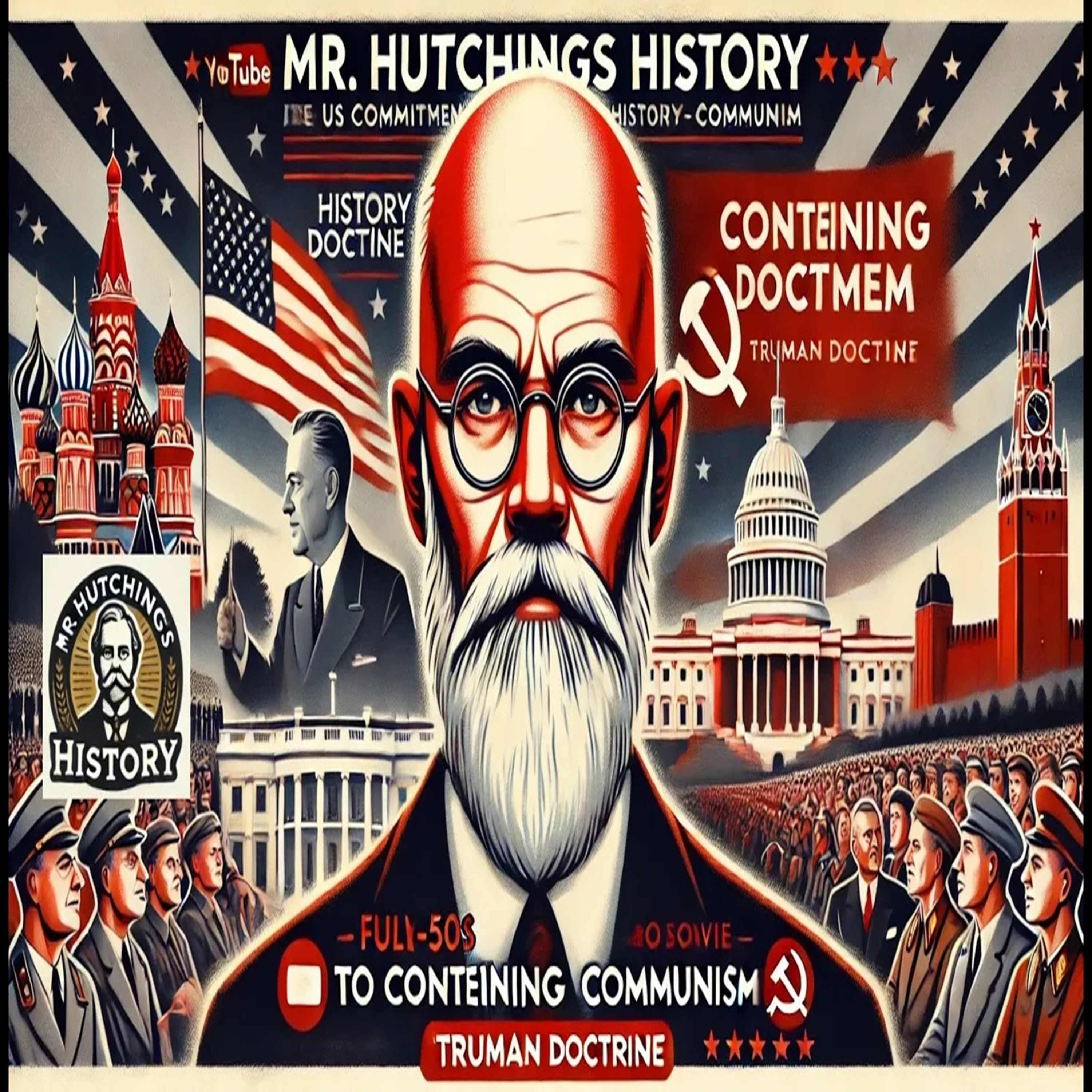 Mr. Hutchings HistoryThe Truman Doctrine and the Division of EuropeWelcome to Mr. Hutchings History! In this episode, we dive into the Truman Doctrine, a landmark speech delivered on March 12, 1947, that solidified the division of Europe and marked the beginning of the Cold War. We explore how Truman’s declaration of support for nations resisting communism shaped US foreign policy and set the stage for the polarization of Europe. From the ideological split to the creation of military and economic blocs, we break down the key themes and immediate consequences of the Truman Doctrine.Key Insights:Context of the post-WWII instability in Greece and TurkeyThe US po...2024-11-2108 min
Mr. Hutchings HistoryThe Truman Doctrine and the Division of EuropeWelcome to Mr. Hutchings History! In this episode, we dive into the Truman Doctrine, a landmark speech delivered on March 12, 1947, that solidified the division of Europe and marked the beginning of the Cold War. We explore how Truman’s declaration of support for nations resisting communism shaped US foreign policy and set the stage for the polarization of Europe. From the ideological split to the creation of military and economic blocs, we break down the key themes and immediate consequences of the Truman Doctrine.Key Insights:Context of the post-WWII instability in Greece and TurkeyThe US po...2024-11-2108 min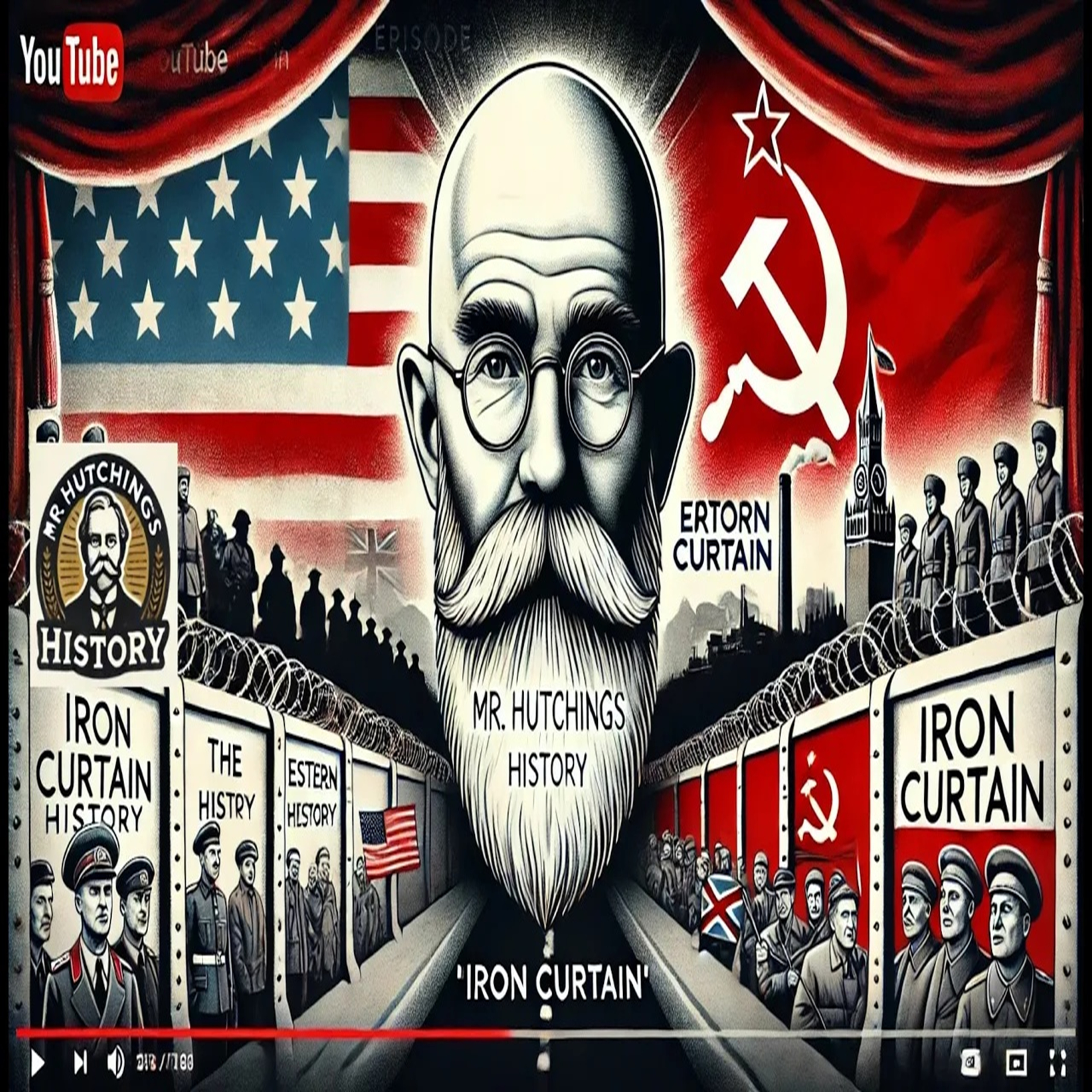 Mr. Hutchings HistoryThe Iron Curtain Speech and the Breakdown of the Grand AllianceWelcome back to Mr. Hutchings History! In this episode, we explore Winston Churchill’s iconic Iron Curtain speech delivered in 1946, marking a key moment in the breakdown of the wartime Grand Alliance between the US, the UK, and the USSR. Churchill’s speech signaled a dramatic shift, highlighting the growing tensions between the Western powers and the Soviet Union, and foreshadowing the Cold War. We’ll examine the historical context, key messages, and immediate reactions to the speech. Through the lens of four historiographical perspectives, we’ll also analyze its lasting impact on global diplomacy and Cold War policies.Key...2024-11-2111 min
Mr. Hutchings HistoryThe Iron Curtain Speech and the Breakdown of the Grand AllianceWelcome back to Mr. Hutchings History! In this episode, we explore Winston Churchill’s iconic Iron Curtain speech delivered in 1946, marking a key moment in the breakdown of the wartime Grand Alliance between the US, the UK, and the USSR. Churchill’s speech signaled a dramatic shift, highlighting the growing tensions between the Western powers and the Soviet Union, and foreshadowing the Cold War. We’ll examine the historical context, key messages, and immediate reactions to the speech. Through the lens of four historiographical perspectives, we’ll also analyze its lasting impact on global diplomacy and Cold War policies.Key...2024-11-2111 min Mr. Hutchings HistoryThe Telegrams That Divided the World – Kennan, Novikov, and the Breakdown of the Grand AllianceWelcome to Mr. Hutchings History! In today’s episode, we dive into two pivotal documents that helped crystallize the breakdown of the Grand Alliance post-WWII: George F. Kennan’s Long Telegram and Nikolai Novikov’s Telegram. These telegrams revealed the emerging mistrust between the US and the Soviet Union, which laid the foundation for the Cold War. We’ll examine the key points of both telegrams, their historical context, and their impact on global policy. We’ll also explore these events through the lens of various historiographical perspectives, including Orthodox, Revisionist, Post-Revisionist, and Realist schools.Key Themes:Kennan’s...2024-11-2110 min
Mr. Hutchings HistoryThe Telegrams That Divided the World – Kennan, Novikov, and the Breakdown of the Grand AllianceWelcome to Mr. Hutchings History! In today’s episode, we dive into two pivotal documents that helped crystallize the breakdown of the Grand Alliance post-WWII: George F. Kennan’s Long Telegram and Nikolai Novikov’s Telegram. These telegrams revealed the emerging mistrust between the US and the Soviet Union, which laid the foundation for the Cold War. We’ll examine the key points of both telegrams, their historical context, and their impact on global policy. We’ll also explore these events through the lens of various historiographical perspectives, including Orthodox, Revisionist, Post-Revisionist, and Realist schools.Key Themes:Kennan’s...2024-11-2110 min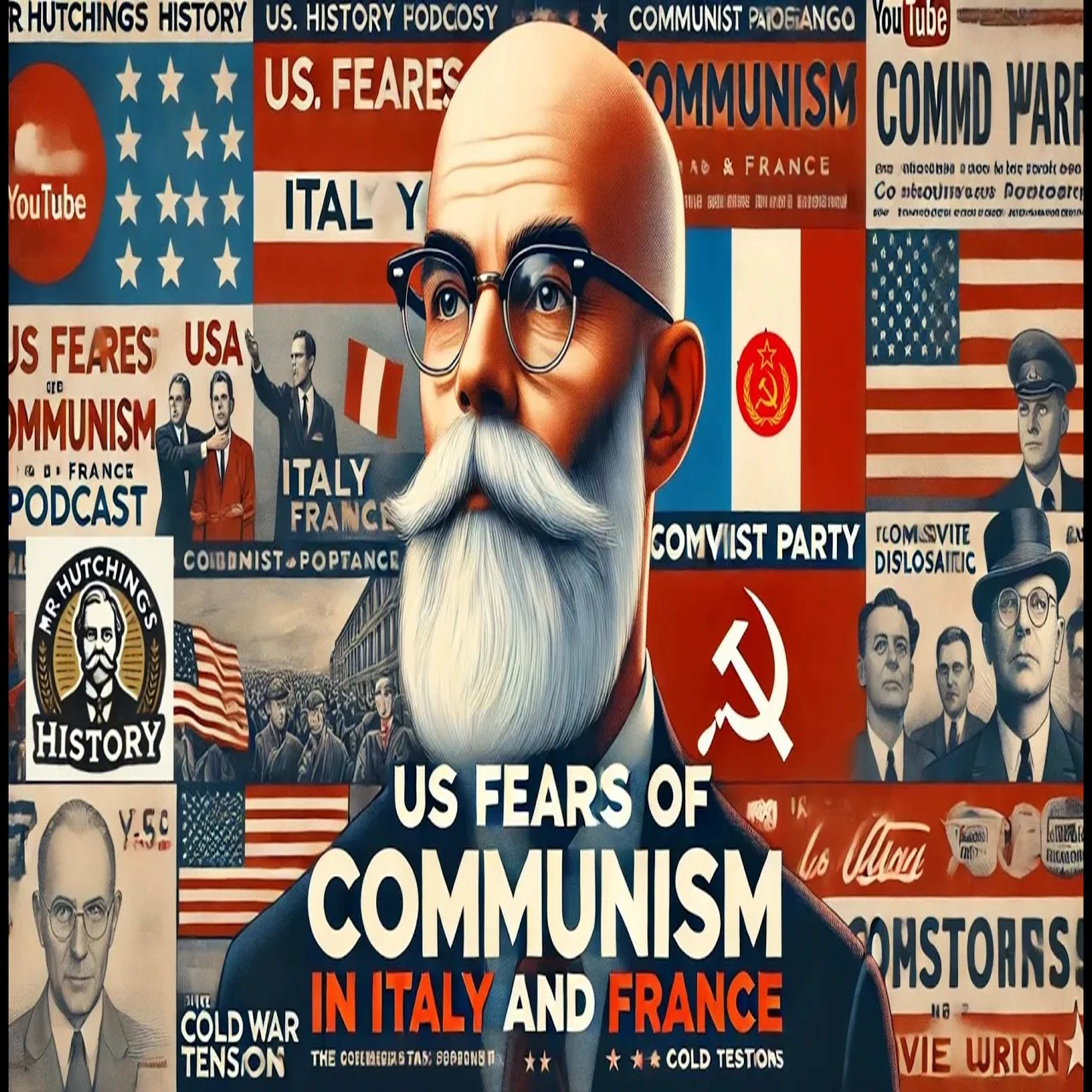 Mr. Hutchings HistoryUS Fears of Communism in Italy and France and the Breakdown of the Grand AllianceWelcome to Mr. Hutchings History! In today’s episode, we analyze the US fears over the rise of Communist parties in Italy and France after World War II and how this contributed to the breakdown of the Grand Alliance between the Soviet Union, the United States, and Great Britain. We explore the geopolitical tensions, the Marshall Plan, the Truman Doctrine, and how these actions set the stage for the Cold War. We also delve into various historiographical perspectives—Orthodox, Revisionist, Realist, and Post-Revisionist—to understand the complexities of this critical moment in history.Key Themes:The rise o...2024-11-2111 min
Mr. Hutchings HistoryUS Fears of Communism in Italy and France and the Breakdown of the Grand AllianceWelcome to Mr. Hutchings History! In today’s episode, we analyze the US fears over the rise of Communist parties in Italy and France after World War II and how this contributed to the breakdown of the Grand Alliance between the Soviet Union, the United States, and Great Britain. We explore the geopolitical tensions, the Marshall Plan, the Truman Doctrine, and how these actions set the stage for the Cold War. We also delve into various historiographical perspectives—Orthodox, Revisionist, Realist, and Post-Revisionist—to understand the complexities of this critical moment in history.Key Themes:The rise o...2024-11-2111 min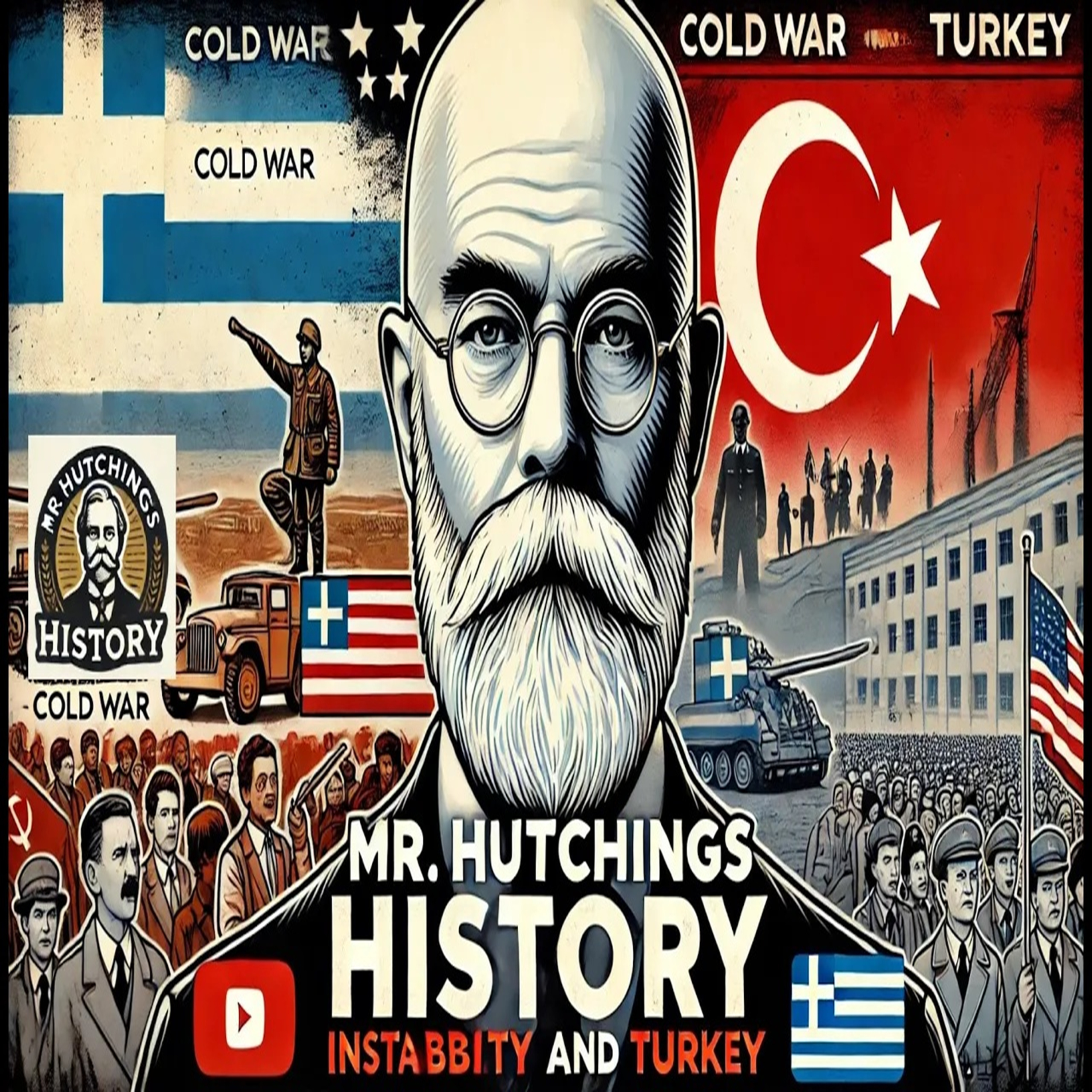 Mr. Hutchings HistoryInstability in Greece and Turkey and the Breakdown of the Grand AllianceWelcome to Mr. Hutchings History! In today’s episode, we explore the geopolitical instability in Greece and Turkey after WWII and how these conflicts contributed to the collapse of the Grand Alliance between the Soviet Union, the United States, and Great Britain. We examine the Truman Doctrine, Soviet pressure, and the U.S. response, highlighting the growing ideological and strategic divides that set the stage for the Cold War. The episode looks at key events, including the civil war in Greece and Soviet demands in Turkey, through the lens of various historiographical perspectives.Historiographical Perspectives:Orthodox Sc...2024-11-2112 min
Mr. Hutchings HistoryInstability in Greece and Turkey and the Breakdown of the Grand AllianceWelcome to Mr. Hutchings History! In today’s episode, we explore the geopolitical instability in Greece and Turkey after WWII and how these conflicts contributed to the collapse of the Grand Alliance between the Soviet Union, the United States, and Great Britain. We examine the Truman Doctrine, Soviet pressure, and the U.S. response, highlighting the growing ideological and strategic divides that set the stage for the Cold War. The episode looks at key events, including the civil war in Greece and Soviet demands in Turkey, through the lens of various historiographical perspectives.Historiographical Perspectives:Orthodox Sc...2024-11-2112 min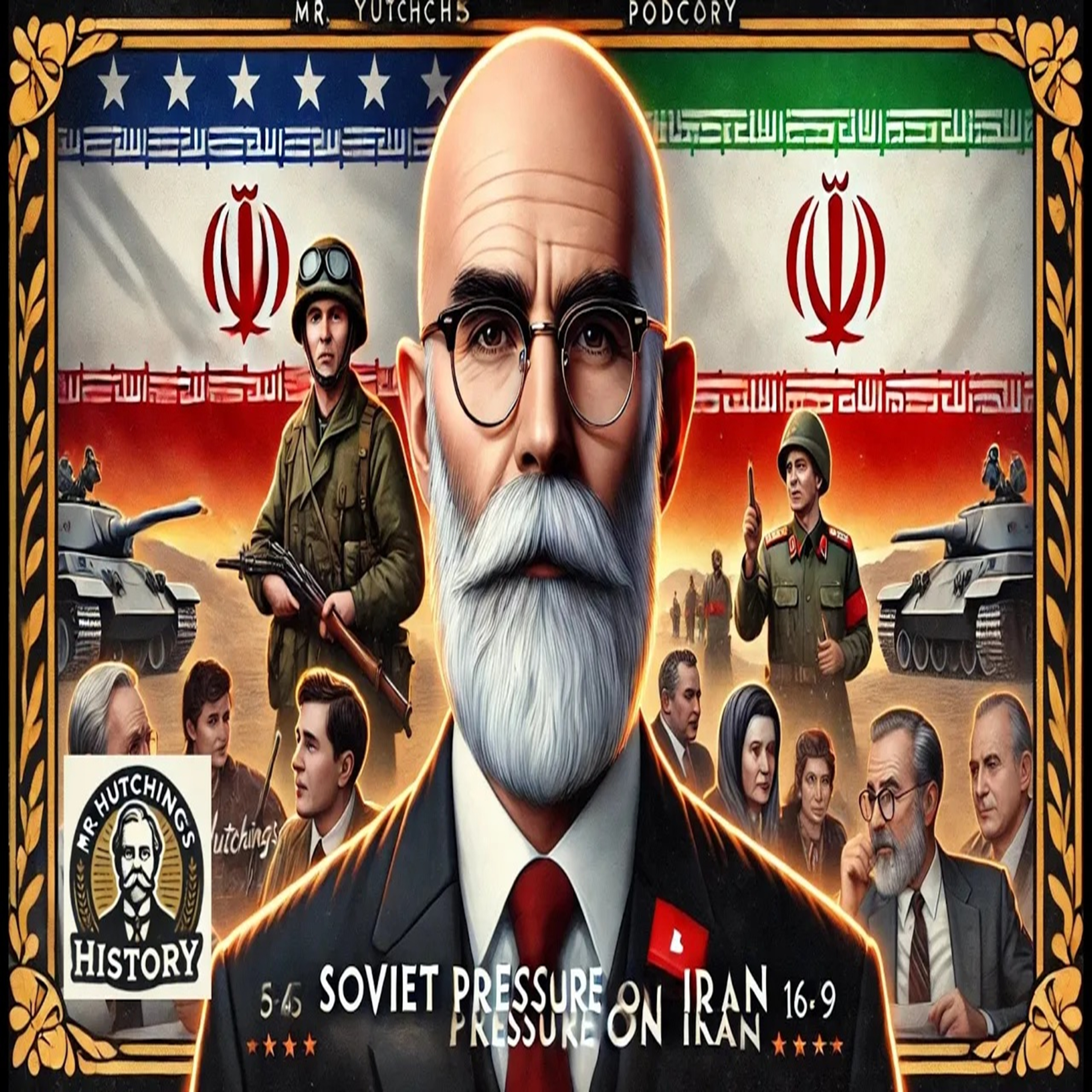 Mr. Hutchings HistorySoviet Pressure on Iran and the Breakdown of the Grand AllianceWelcome to Mr. Hutchings History! In today’s episode, we delve into the Soviet pressure on Iran in 1946 and its impact on the breakdown of the Grand Alliance. After World War II, Stalin’s decision to keep Soviet troops stationed in Iran and support a Communist uprising escalated tensions with the Western Allies. This pivotal moment highlighted the growing rift between the Soviet Union and the United States, contributing to the onset of the Cold War.We’ll explore different schools of historical thought, examining whether Stalin’s actions were motivated by expansionism or security concerns. The Iranian...2024-11-2109 min
Mr. Hutchings HistorySoviet Pressure on Iran and the Breakdown of the Grand AllianceWelcome to Mr. Hutchings History! In today’s episode, we delve into the Soviet pressure on Iran in 1946 and its impact on the breakdown of the Grand Alliance. After World War II, Stalin’s decision to keep Soviet troops stationed in Iran and support a Communist uprising escalated tensions with the Western Allies. This pivotal moment highlighted the growing rift between the Soviet Union and the United States, contributing to the onset of the Cold War.We’ll explore different schools of historical thought, examining whether Stalin’s actions were motivated by expansionism or security concerns. The Iranian...2024-11-2109 min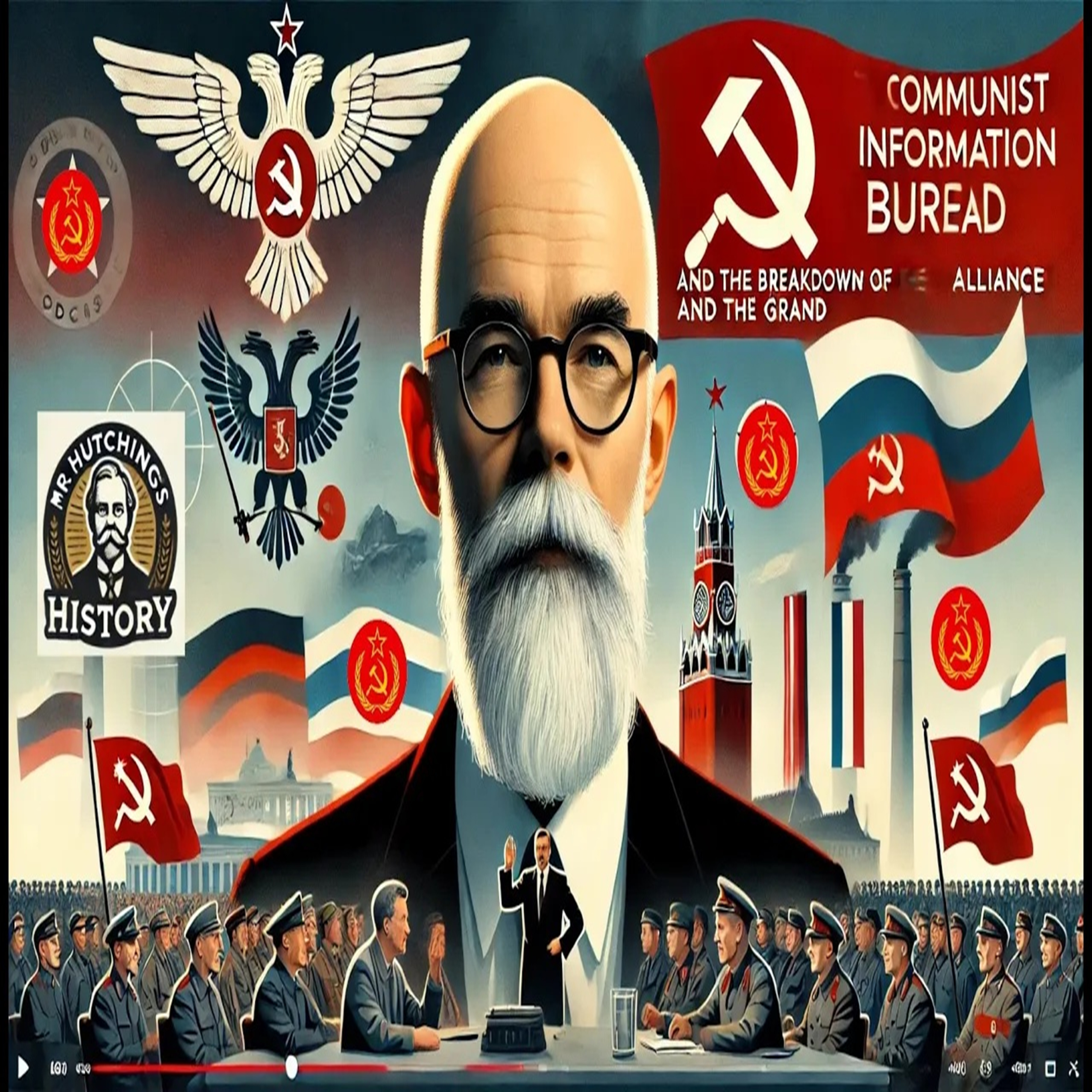 Mr. Hutchings HistoryThe Communist Information Bureau and the Breakdown of the Grand AllianceWelcome toMr. Hutchings History! In this episode, we explore how the creation of the Communist Information Bureau (Cominform) in 1947 contributed to the breakdown of the Grand Alliance between the Soviet Union and the Western Allies. We’ll dive into Cominform’s role in consolidating Soviet control over Eastern Europe, its attempts to influence Western Europe, and how this institution marked a key shift in post-war geopolitics.Through multiple schools of thought, we examine whether Soviet actions were expansionist or defensive and explore how Cominform exacerbated tensions leading to the Cold War. From the suppression of political opposition in P...2024-11-2109 min
Mr. Hutchings HistoryThe Communist Information Bureau and the Breakdown of the Grand AllianceWelcome toMr. Hutchings History! In this episode, we explore how the creation of the Communist Information Bureau (Cominform) in 1947 contributed to the breakdown of the Grand Alliance between the Soviet Union and the Western Allies. We’ll dive into Cominform’s role in consolidating Soviet control over Eastern Europe, its attempts to influence Western Europe, and how this institution marked a key shift in post-war geopolitics.Through multiple schools of thought, we examine whether Soviet actions were expansionist or defensive and explore how Cominform exacerbated tensions leading to the Cold War. From the suppression of political opposition in P...2024-11-2109 min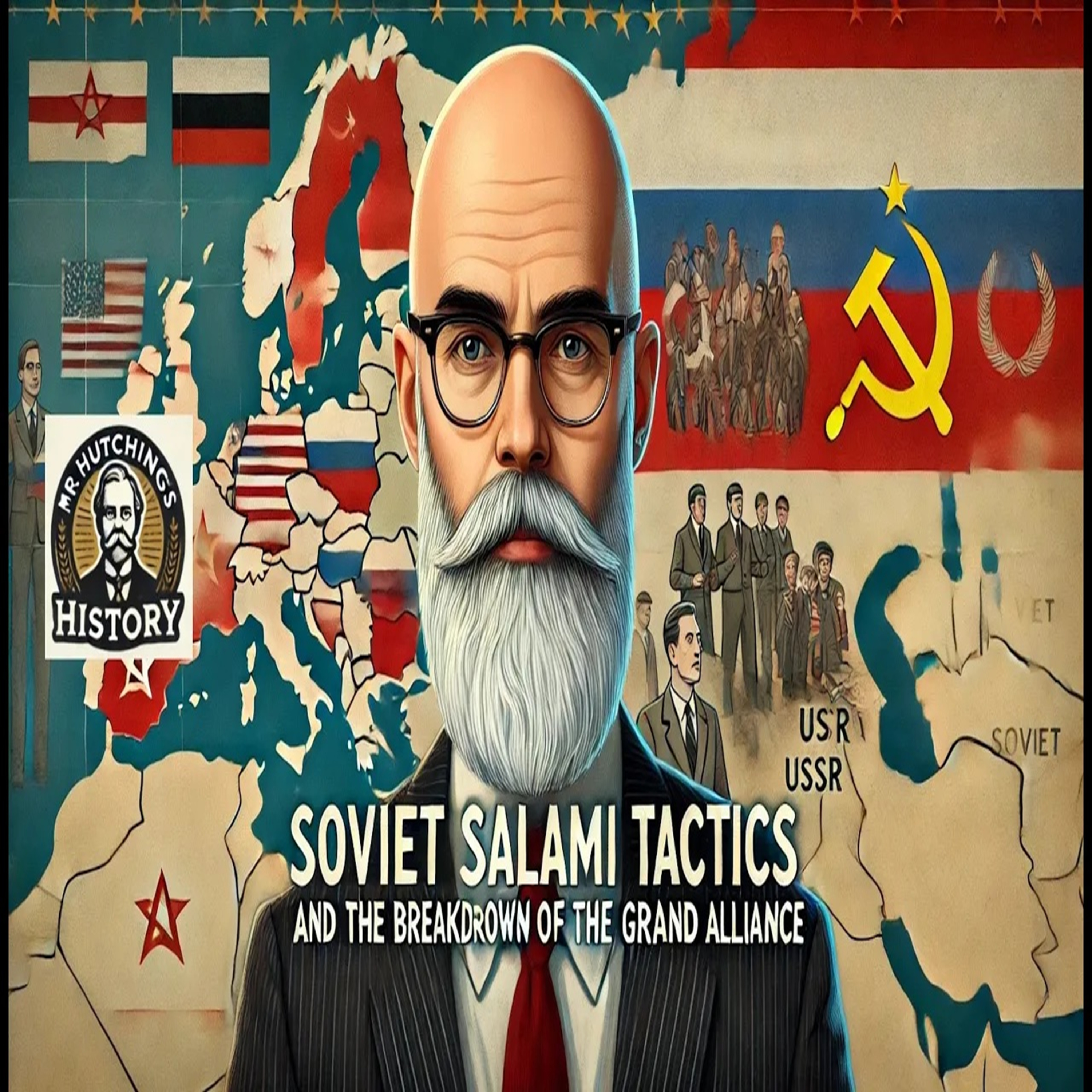 Mr. Hutchings HistorySoviet Salami Tactics and the Breakdown of the Grand AllianceWelcome toMr. Hutchings History! In this episode, we dive into the Soviet Union's use of "salami tactics" to gradually dominate Eastern Europe after World War II. This strategy was a key factor in the breakdown of the Grand Alliance, setting the stage for the Cold War. We’ll explore how Stalin consolidated power through military, political, and economic tactics in Poland, Hungary, Romania, and Bulgaria, and how this affected relations with the West.We’ll also examine the differing perspectives from key historiographical schools—Orthodox, Revisionist, Post-Revisionist, and Realist—on whether Soviet actions were driven by expansionism or secur...2024-11-2112 min
Mr. Hutchings HistorySoviet Salami Tactics and the Breakdown of the Grand AllianceWelcome toMr. Hutchings History! In this episode, we dive into the Soviet Union's use of "salami tactics" to gradually dominate Eastern Europe after World War II. This strategy was a key factor in the breakdown of the Grand Alliance, setting the stage for the Cold War. We’ll explore how Stalin consolidated power through military, political, and economic tactics in Poland, Hungary, Romania, and Bulgaria, and how this affected relations with the West.We’ll also examine the differing perspectives from key historiographical schools—Orthodox, Revisionist, Post-Revisionist, and Realist—on whether Soviet actions were driven by expansionism or secur...2024-11-2112 min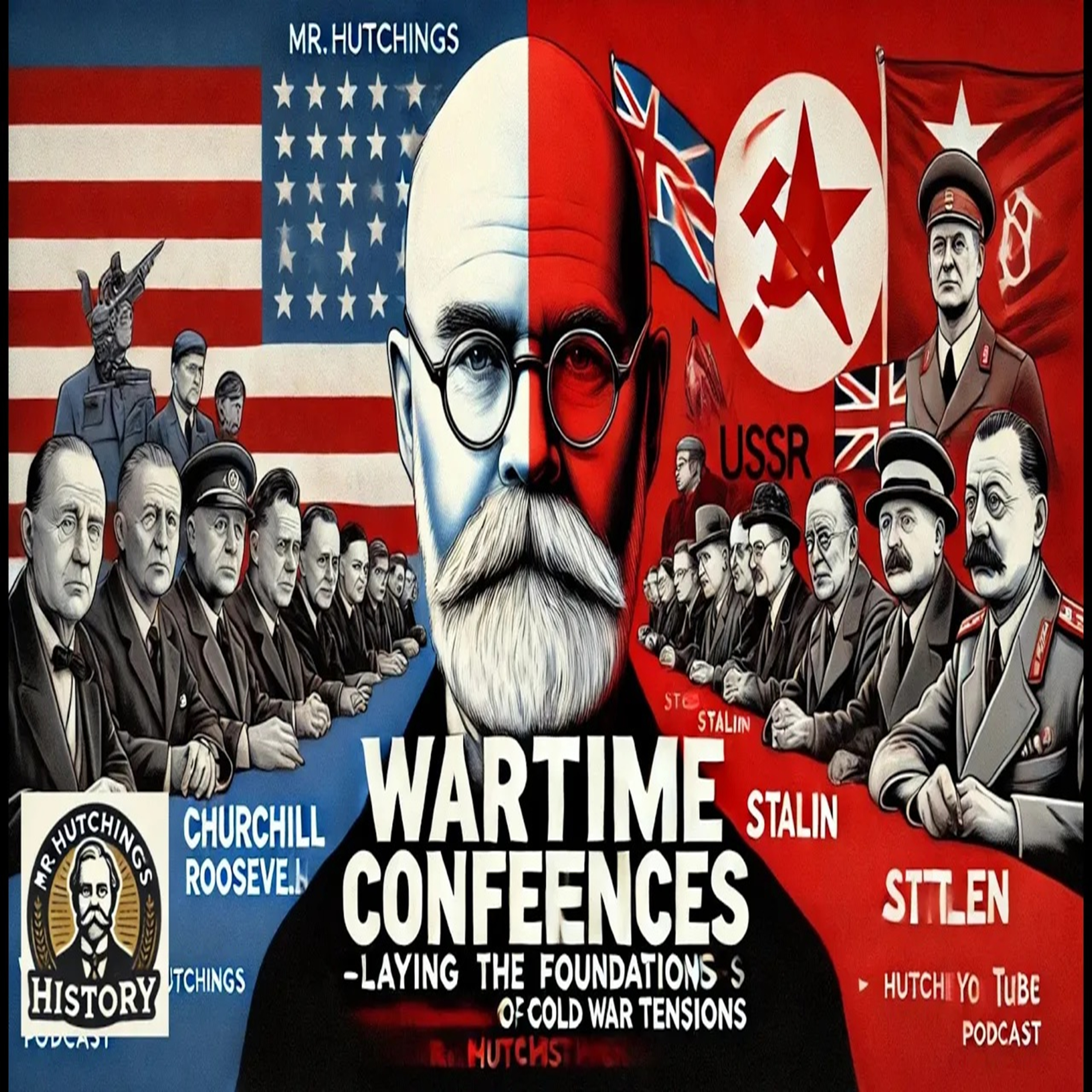 Mr. Hutchings HistoryWartime Conferences – Laying the Foundations for Cold War TensionsWelcome toMr. Hutchings History! In today’s episode, we analyze the Wartime Conferences of World War II—Tehran, Yalta, and Potsdam—and how they set the stage for the Cold War. While these meetings aimed to coordinate the Allied war effort, they also exposed deep ideological divides between the United States and the Soviet Union, planting the seeds of Cold War tensions.We’ll cover key issues from each conference, such as the future of Eastern Europe, the division of Germany, and the first hints of atomic diplomacy. We’ll also explore how these tensions grew due to differi...2024-11-2113 min
Mr. Hutchings HistoryWartime Conferences – Laying the Foundations for Cold War TensionsWelcome toMr. Hutchings History! In today’s episode, we analyze the Wartime Conferences of World War II—Tehran, Yalta, and Potsdam—and how they set the stage for the Cold War. While these meetings aimed to coordinate the Allied war effort, they also exposed deep ideological divides between the United States and the Soviet Union, planting the seeds of Cold War tensions.We’ll cover key issues from each conference, such as the future of Eastern Europe, the division of Germany, and the first hints of atomic diplomacy. We’ll also explore how these tensions grew due to differi...2024-11-2113 min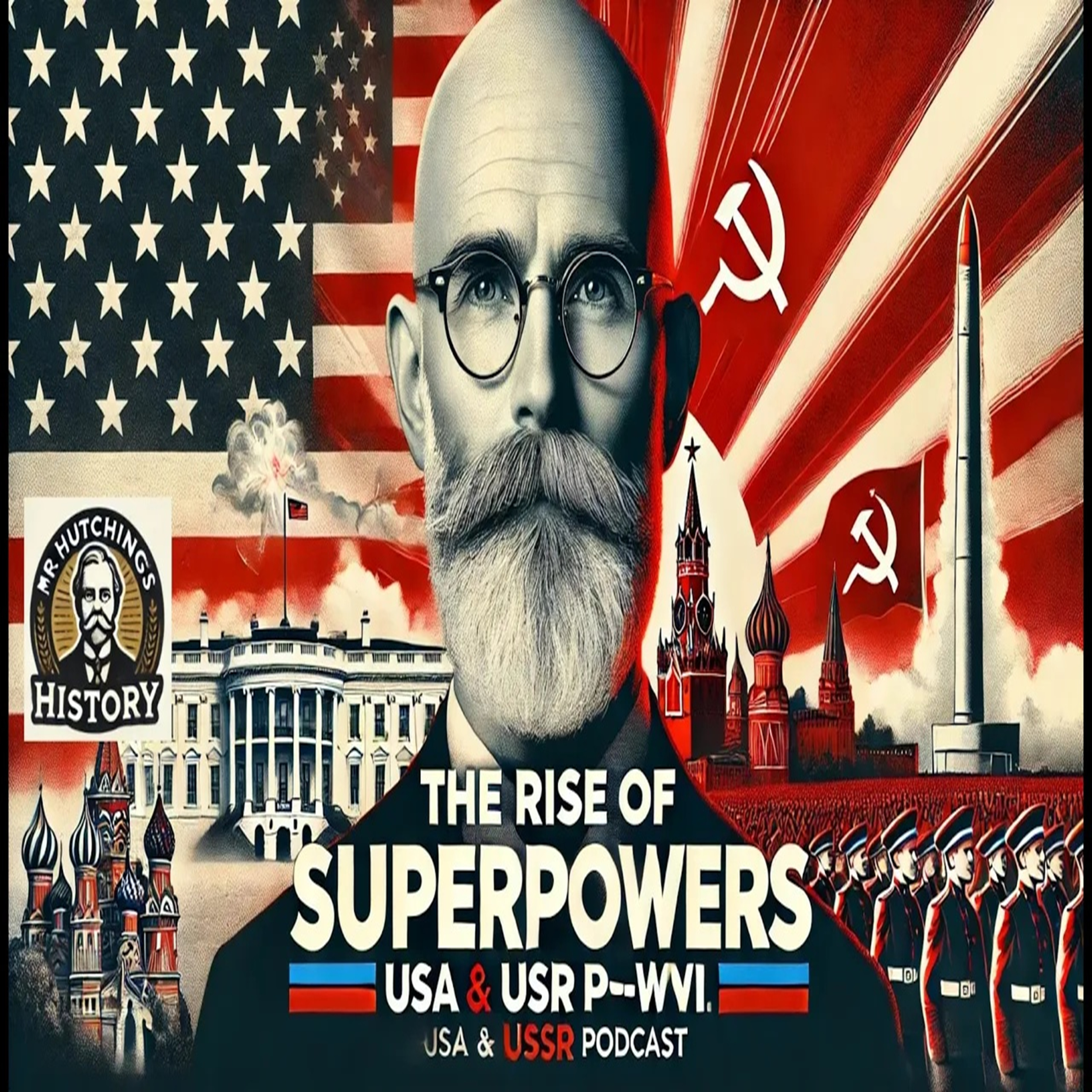 Mr. Hutchings HistoryThe Rise of Superpowers – USA and USSR Post-WWIIWelcome toMr. Hutchings History! In today’s episode, we explore the emergence of the United States and the Soviet Union as global superpowers after World War II. What military, economic, and political factors contributed to their rise? We’ll delve into key events like the Yalta and Potsdam Conferences, the Marshall Plan, and the Berlin Blockade, examining how the U.S. and USSR solidified their dominance on the world stage.We’ll also explore the ideological divide between American liberal democracy and Soviet communism, which set the stage for the Cold War. Was the superpower rivalry inevitable, or was...2024-11-2112 min
Mr. Hutchings HistoryThe Rise of Superpowers – USA and USSR Post-WWIIWelcome toMr. Hutchings History! In today’s episode, we explore the emergence of the United States and the Soviet Union as global superpowers after World War II. What military, economic, and political factors contributed to their rise? We’ll delve into key events like the Yalta and Potsdam Conferences, the Marshall Plan, and the Berlin Blockade, examining how the U.S. and USSR solidified their dominance on the world stage.We’ll also explore the ideological divide between American liberal democracy and Soviet communism, which set the stage for the Cold War. Was the superpower rivalry inevitable, or was...2024-11-2112 min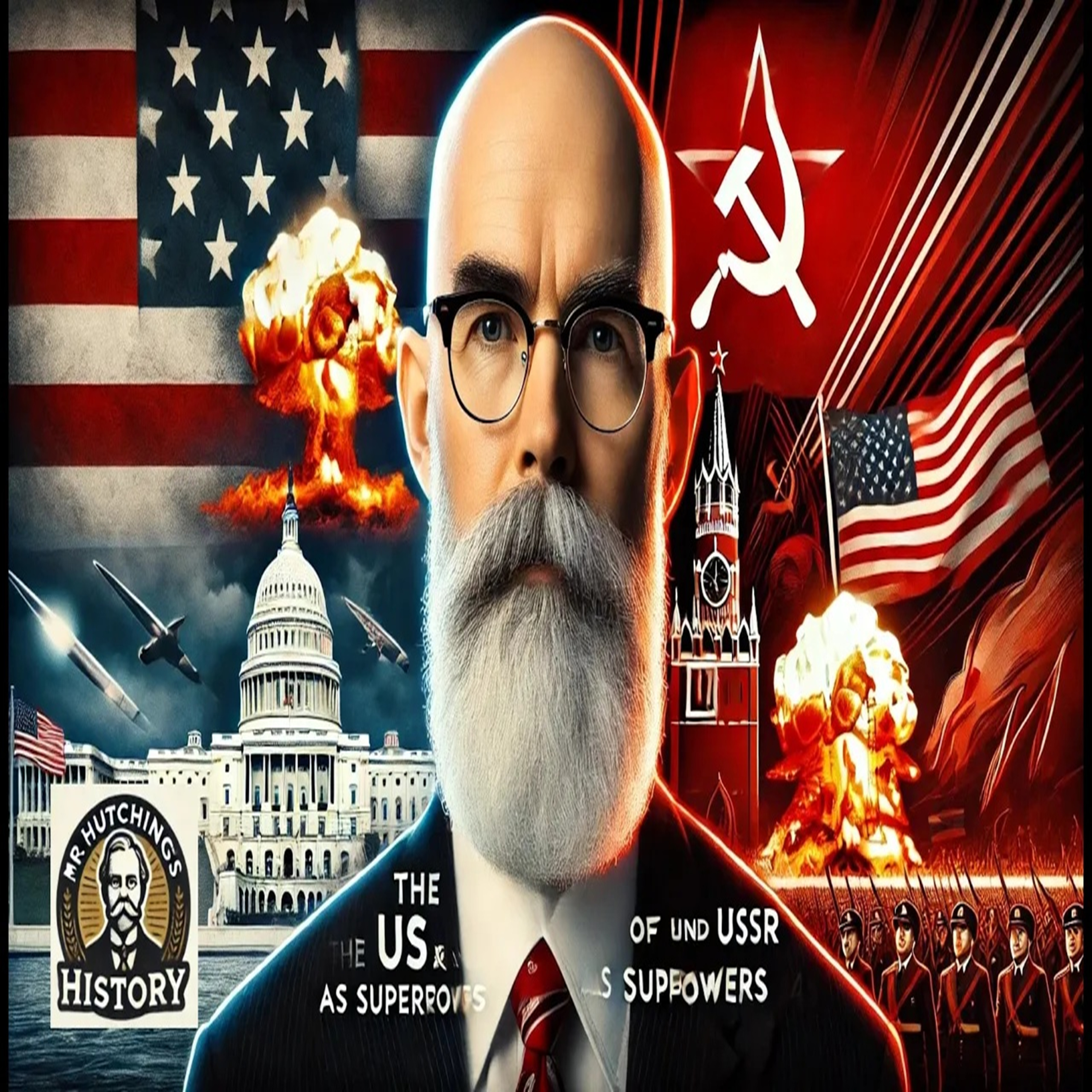 Mr. Hutchings HistoryThe Emergence of the US and USSR as Superpowers in 1945Welcome toMr. Hutchings History. In this episode, we explore why the United States and the Soviet Union emerged as superpowers in 1945, following the end of World War II. We’ll dive into the military, economic, and political factors that shaped their rise, analyzing key events like the Yalta and Potsdam Conferences and the early stages of the Cold War. Discover the ideological divide between the U.S. and the USSR, with the U.S. representing capitalism and democracy, and the USSR advocating for communism and state control.We’ll also examine the critical role of nuclear weapons, the...2024-11-2116 min
Mr. Hutchings HistoryThe Emergence of the US and USSR as Superpowers in 1945Welcome toMr. Hutchings History. In this episode, we explore why the United States and the Soviet Union emerged as superpowers in 1945, following the end of World War II. We’ll dive into the military, economic, and political factors that shaped their rise, analyzing key events like the Yalta and Potsdam Conferences and the early stages of the Cold War. Discover the ideological divide between the U.S. and the USSR, with the U.S. representing capitalism and democracy, and the USSR advocating for communism and state control.We’ll also examine the critical role of nuclear weapons, the...2024-11-2116 min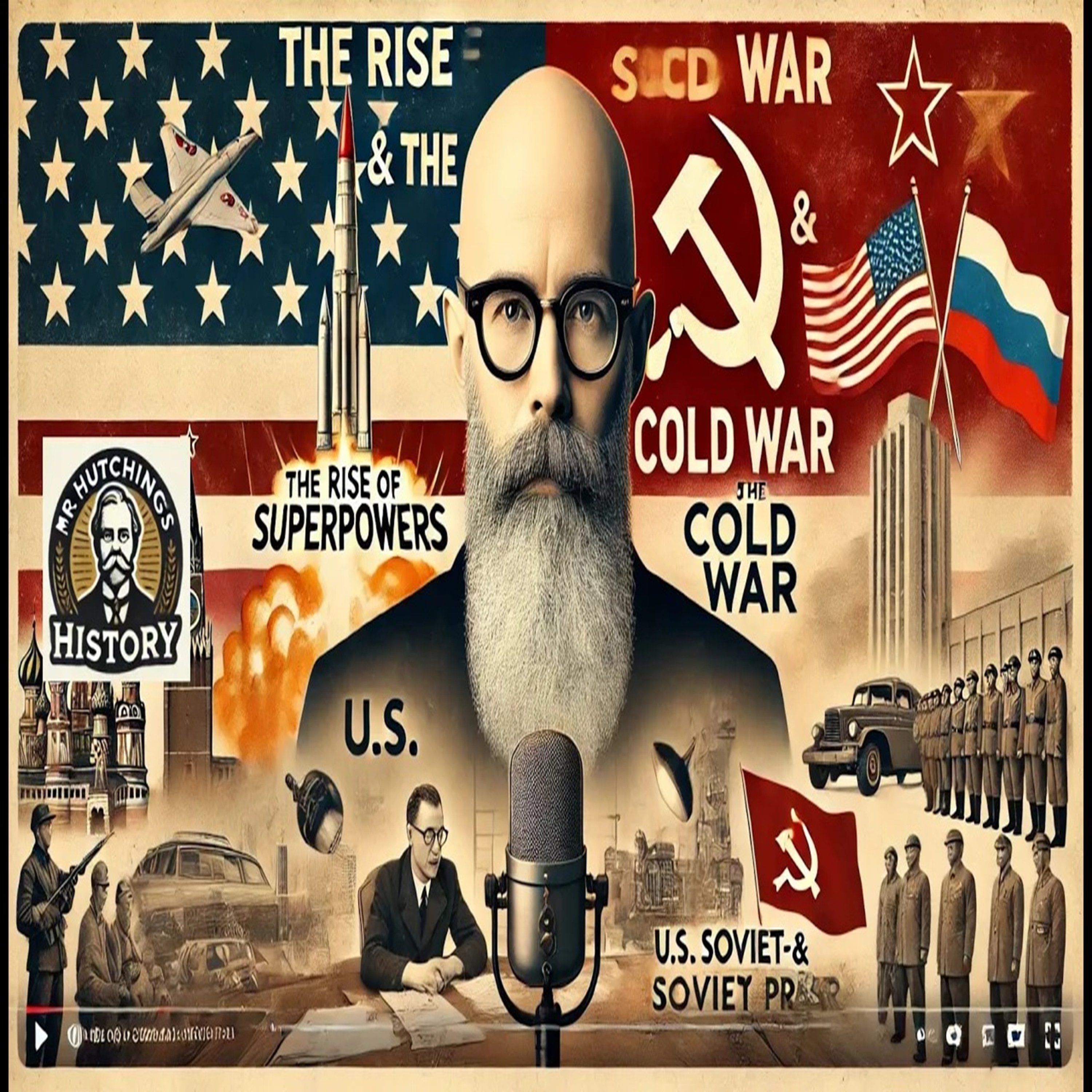 Mr. Hutchings HistoryThe Rise of Superpowers and the Origins of the Cold War: An OverviewWelcome toMr. Hutchings History. In this episode, we explore the origins of the Cold War, one of the most defining conflicts of the 20th century. We’ll examine how the US and USSR emerged as superpowers by 1945, and how wartime conferences like Yalta and Potsdam set the stage for superpower rivalry. What were the key ideological differences that led to tensions? Why did Europe become politically and militarily divided by 1949? We’ll delve into the breakdown of the Grand Alliance and the division of Europe, analyzing key events like the Berlin Blockade and the Marshall Plan.Through a mi...2024-11-2108 min
Mr. Hutchings HistoryThe Rise of Superpowers and the Origins of the Cold War: An OverviewWelcome toMr. Hutchings History. In this episode, we explore the origins of the Cold War, one of the most defining conflicts of the 20th century. We’ll examine how the US and USSR emerged as superpowers by 1945, and how wartime conferences like Yalta and Potsdam set the stage for superpower rivalry. What were the key ideological differences that led to tensions? Why did Europe become politically and militarily divided by 1949? We’ll delve into the breakdown of the Grand Alliance and the division of Europe, analyzing key events like the Berlin Blockade and the Marshall Plan.Through a mi...2024-11-2108 min In Our TimeCondorcetMelvyn Bragg and guests discuss Nicolas de Condorcet (1743-94), known as the Last of the Philosophes, the intellectuals in the French Enlightenment who sought to apply their learning to solving the problems of their world. He became a passionate believer in the progress of society, an advocate for equal rights for women and the abolition of the slave trade and for representative government. The French Revolution gave him a chance to advance those ideas and, while the Terror brought his life to an end, his wife Sophie de Grouchy 91764-1822) ensured his influence into the next century and beyond. 2024-02-0850 min
In Our TimeCondorcetMelvyn Bragg and guests discuss Nicolas de Condorcet (1743-94), known as the Last of the Philosophes, the intellectuals in the French Enlightenment who sought to apply their learning to solving the problems of their world. He became a passionate believer in the progress of society, an advocate for equal rights for women and the abolition of the slave trade and for representative government. The French Revolution gave him a chance to advance those ideas and, while the Terror brought his life to an end, his wife Sophie de Grouchy 91764-1822) ensured his influence into the next century and beyond. 2024-02-0850 min In Our Time: PhilosophyCondorcetMelvyn Bragg and guests discuss Nicolas de Condorcet (1743-94), known as the Last of the Philosophes, the intellectuals in the French Enlightenment who sought to apply their learning to solving the problems of their world. He became a passionate believer in the progress of society, an advocate for equal rights for women and the abolition of the slave trade and for representative government. The French Revolution gave him a chance to advance those ideas and, while the Terror brought his life to an end, his wife Sophie de Grouchy 91764-1822) ensured his influence into the next century and beyond. 2024-02-0850 min
In Our Time: PhilosophyCondorcetMelvyn Bragg and guests discuss Nicolas de Condorcet (1743-94), known as the Last of the Philosophes, the intellectuals in the French Enlightenment who sought to apply their learning to solving the problems of their world. He became a passionate believer in the progress of society, an advocate for equal rights for women and the abolition of the slave trade and for representative government. The French Revolution gave him a chance to advance those ideas and, while the Terror brought his life to an end, his wife Sophie de Grouchy 91764-1822) ensured his influence into the next century and beyond. 2024-02-0850 min Celebrating WomenKathy Williams Bosley Part 2Send us a textWe had such a wonderful time conversing with Kathy Williams Bosley that conversation lasted over two episodes. We jump back as Kathy tells us of her time in Tyler and shares about how she is constantly working to grow within her three pillars: mentally, spiritually and physically. She shares details and offers wisdom and encouragement as well as practical tips in these areas. Enjoy!As an additional treat. Kathy shared her reading list with us. Happy reading:All books by Max Lucado especially “The Applause of Heaven” and “You are...2023-07-1845 min
Celebrating WomenKathy Williams Bosley Part 2Send us a textWe had such a wonderful time conversing with Kathy Williams Bosley that conversation lasted over two episodes. We jump back as Kathy tells us of her time in Tyler and shares about how she is constantly working to grow within her three pillars: mentally, spiritually and physically. She shares details and offers wisdom and encouragement as well as practical tips in these areas. Enjoy!As an additional treat. Kathy shared her reading list with us. Happy reading:All books by Max Lucado especially “The Applause of Heaven” and “You are...2023-07-1845 min Decades of Horror | Horror News RadioTHE CHANGELING (1980) – Episode 225 – Decades Of Horror 1980s“That house is not fit to live in. No one’s been able to live in it. It doesn’t want people.” That sounds like a challenge. Join your faithful Grue-Crew – Chad Hunt, Bill Mulligan, Crystal Cleveland, and Jeff Mohr – as they discuss The Changeling (1980), the ghost story held in high regard by no less than Martin Scorsese (who named it one of the scariest movies of all time) and Guillermo del Toro. Decades of Horror 1980s Episode 225 – The Changeling (1980) Join the Crew on the Gruesome Magazine YouTube channel! Subscribe today! And click the alert to get notified of...2023-02-061h 10
Decades of Horror | Horror News RadioTHE CHANGELING (1980) – Episode 225 – Decades Of Horror 1980s“That house is not fit to live in. No one’s been able to live in it. It doesn’t want people.” That sounds like a challenge. Join your faithful Grue-Crew – Chad Hunt, Bill Mulligan, Crystal Cleveland, and Jeff Mohr – as they discuss The Changeling (1980), the ghost story held in high regard by no less than Martin Scorsese (who named it one of the scariest movies of all time) and Guillermo del Toro. Decades of Horror 1980s Episode 225 – The Changeling (1980) Join the Crew on the Gruesome Magazine YouTube channel! Subscribe today! And click the alert to get notified of...2023-02-061h 10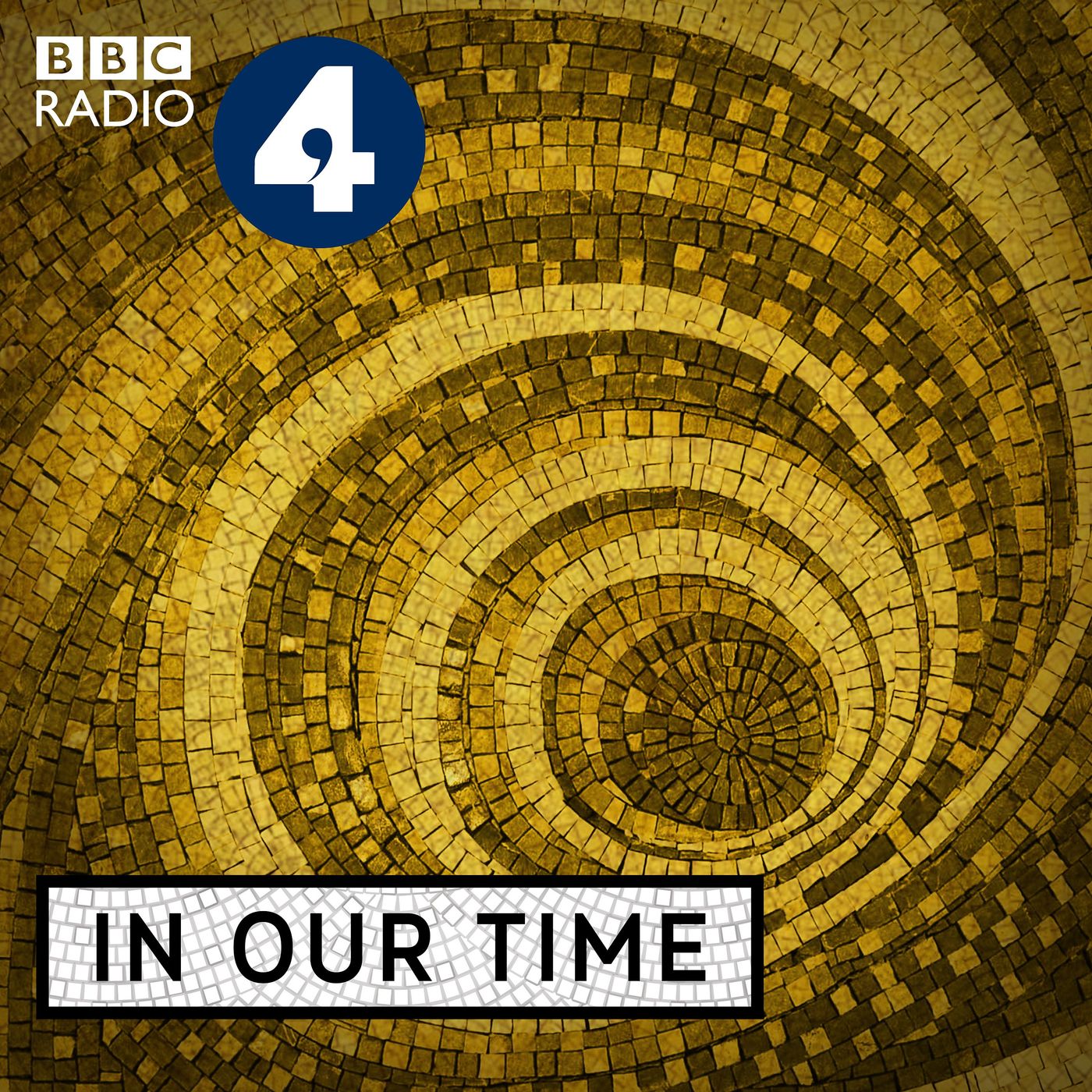 In Our TimeDylan ThomasMelvyn Bragg and guests discuss the celebrated Welsh poet, Dylan Thomas (1914 - 1953). He wrote some of his best poems before he was twenty in the first half of his short, remarkable life, and was prolific in the second half too with poems such as those set in London under the Blitz and reworkings of his childhood in Swansea, and his famous radio play Under Milk Wood (performed after his death). He was read widely and widely heard: with his reading tours in America and recordings of his works that sold in their hundreds of thousands after his death, he is...2022-07-1451 min
In Our TimeDylan ThomasMelvyn Bragg and guests discuss the celebrated Welsh poet, Dylan Thomas (1914 - 1953). He wrote some of his best poems before he was twenty in the first half of his short, remarkable life, and was prolific in the second half too with poems such as those set in London under the Blitz and reworkings of his childhood in Swansea, and his famous radio play Under Milk Wood (performed after his death). He was read widely and widely heard: with his reading tours in America and recordings of his works that sold in their hundreds of thousands after his death, he is...2022-07-1451 min In Our TimeDylan ThomasMelvyn Bragg and guests discuss the celebrated Welsh poet, Dylan Thomas (1914 - 1953). He wrote some of his best poems before he was twenty in the first half of his short, remarkable life, and was prolific in the second half too with poems such as those set in London under the Blitz and reworkings of his childhood in Swansea, and his famous radio play Under Milk Wood (performed after his death). He was read widely and widely heard: with his reading tours in America and recordings of his works that sold in their hundreds of thousands after his death, he...2022-07-1450 min
In Our TimeDylan ThomasMelvyn Bragg and guests discuss the celebrated Welsh poet, Dylan Thomas (1914 - 1953). He wrote some of his best poems before he was twenty in the first half of his short, remarkable life, and was prolific in the second half too with poems such as those set in London under the Blitz and reworkings of his childhood in Swansea, and his famous radio play Under Milk Wood (performed after his death). He was read widely and widely heard: with his reading tours in America and recordings of his works that sold in their hundreds of thousands after his death, he...2022-07-1450 min In Our Time: CultureDylan ThomasMelvyn Bragg and guests discuss the celebrated Welsh poet, Dylan Thomas (1914 - 1953). He wrote some of his best poems before he was twenty in the first half of his short, remarkable life, and was prolific in the second half too with poems such as those set in London under the Blitz and reworkings of his childhood in Swansea, and his famous radio play Under Milk Wood (performed after his death). He was read widely and widely heard: with his reading tours in America and recordings of his works that sold in their hundreds of thousands after his death, he...2022-07-1450 min
In Our Time: CultureDylan ThomasMelvyn Bragg and guests discuss the celebrated Welsh poet, Dylan Thomas (1914 - 1953). He wrote some of his best poems before he was twenty in the first half of his short, remarkable life, and was prolific in the second half too with poems such as those set in London under the Blitz and reworkings of his childhood in Swansea, and his famous radio play Under Milk Wood (performed after his death). He was read widely and widely heard: with his reading tours in America and recordings of his works that sold in their hundreds of thousands after his death, he...2022-07-1450 min In Our Time: ScienceCoralsMelvyn Bragg and guests discuss the simple animals which informed Charles Darwin's first book, The Structure and Distribution of Coral Reefs, published in 1842. From corals, Darwin concluded that the Earth changed very slowly and was not fashioned by God. Now coral reefs, which some liken to undersea rainforests, are threatened by human activity, including fishing, pollution and climate change. WithSteve Jones
Senior Research Fellow in Genetics at University College LondonNicola Foster
Lecturer in Marine Biology at the University of Plymouth AndGareth Williams
Associate Professor in Marine...2021-10-2851 min
In Our Time: ScienceCoralsMelvyn Bragg and guests discuss the simple animals which informed Charles Darwin's first book, The Structure and Distribution of Coral Reefs, published in 1842. From corals, Darwin concluded that the Earth changed very slowly and was not fashioned by God. Now coral reefs, which some liken to undersea rainforests, are threatened by human activity, including fishing, pollution and climate change. WithSteve Jones
Senior Research Fellow in Genetics at University College LondonNicola Foster
Lecturer in Marine Biology at the University of Plymouth AndGareth Williams
Associate Professor in Marine...2021-10-2851 min RSDS RADIO SOCIETÀ DEI SOGNICoralsMelvyn Bragg and guests discuss the simple animals which informed Charles Darwin's first book, The Structure and Distribution of Coral Reefs, published in 1842. From corals, Darwin concluded that the Earth changed very slowly and was not fashioned by God. Now coral reefs, which some liken to undersea rainforests, are threatened by human activity, including fishing, pollution and climate change. WithSteve Jones Senior Research Fellow in Genetics at University College LondonNicola Foster Lecturer in Marine Biology at the University of Plymouth AndGareth Williams Associate Professor...2021-10-2852 min
RSDS RADIO SOCIETÀ DEI SOGNICoralsMelvyn Bragg and guests discuss the simple animals which informed Charles Darwin's first book, The Structure and Distribution of Coral Reefs, published in 1842. From corals, Darwin concluded that the Earth changed very slowly and was not fashioned by God. Now coral reefs, which some liken to undersea rainforests, are threatened by human activity, including fishing, pollution and climate change. WithSteve Jones Senior Research Fellow in Genetics at University College LondonNicola Foster Lecturer in Marine Biology at the University of Plymouth AndGareth Williams Associate Professor...2021-10-2852 min In Our TimeCoralsMelvyn Bragg and guests discuss the simple animals which informed Charles Darwin's first book, The Structure and Distribution of Coral Reefs, published in 1842. From corals, Darwin concluded that the Earth changed very slowly and was not fashioned by God. Now coral reefs, which some liken to undersea rainforests, are threatened by human activity, including fishing, pollution and climate change. WithSteve Jones
Senior Research Fellow in Genetics at University College LondonNicola Foster
Lecturer in Marine Biology at the University of Plymouth AndGareth Williams
Associate Professor in Marine...2021-10-2851 min
In Our TimeCoralsMelvyn Bragg and guests discuss the simple animals which informed Charles Darwin's first book, The Structure and Distribution of Coral Reefs, published in 1842. From corals, Darwin concluded that the Earth changed very slowly and was not fashioned by God. Now coral reefs, which some liken to undersea rainforests, are threatened by human activity, including fishing, pollution and climate change. WithSteve Jones
Senior Research Fellow in Genetics at University College LondonNicola Foster
Lecturer in Marine Biology at the University of Plymouth AndGareth Williams
Associate Professor in Marine...2021-10-2851 min Triumph Pest ControlRats in Flat Roof / Extension of HouseLong Term Solutions to Rats in Flat Roof / Extension of House. CCTV Rat Drain Survey. Investigation work is needed. Rat Flap. What’s that I hear you say..?2021-02-2308 min
Triumph Pest ControlRats in Flat Roof / Extension of HouseLong Term Solutions to Rats in Flat Roof / Extension of House. CCTV Rat Drain Survey. Investigation work is needed. Rat Flap. What’s that I hear you say..?2021-02-2308 min Fresh Leaf ForeverMulti-sport involvement and establishing identity in sportsOur guest Melvyn Williams is the managing partner and director of Human Performance for the Infinite Sports Performance Group since 2003. Melvyn has trained and consulted over 200 professional athletes across the NFL, NBA, MLB, ATP/WTA and several Olympic athletes.He holds advanced certifications in performance enhancement, strength and conditioning, behavioral science, coaching and corrective exercise.In this episode, Melvyn discusses with host Vai the importance of -1.understanding an athlete's goals and allowing them to express freely to be successful in what they do. 2.Benefits of playing multiple sports, choosing the right path to focus an...2021-01-1258 min
Fresh Leaf ForeverMulti-sport involvement and establishing identity in sportsOur guest Melvyn Williams is the managing partner and director of Human Performance for the Infinite Sports Performance Group since 2003. Melvyn has trained and consulted over 200 professional athletes across the NFL, NBA, MLB, ATP/WTA and several Olympic athletes.He holds advanced certifications in performance enhancement, strength and conditioning, behavioral science, coaching and corrective exercise.In this episode, Melvyn discusses with host Vai the importance of -1.understanding an athlete's goals and allowing them to express freely to be successful in what they do. 2.Benefits of playing multiple sports, choosing the right path to focus an...2021-01-1258 min